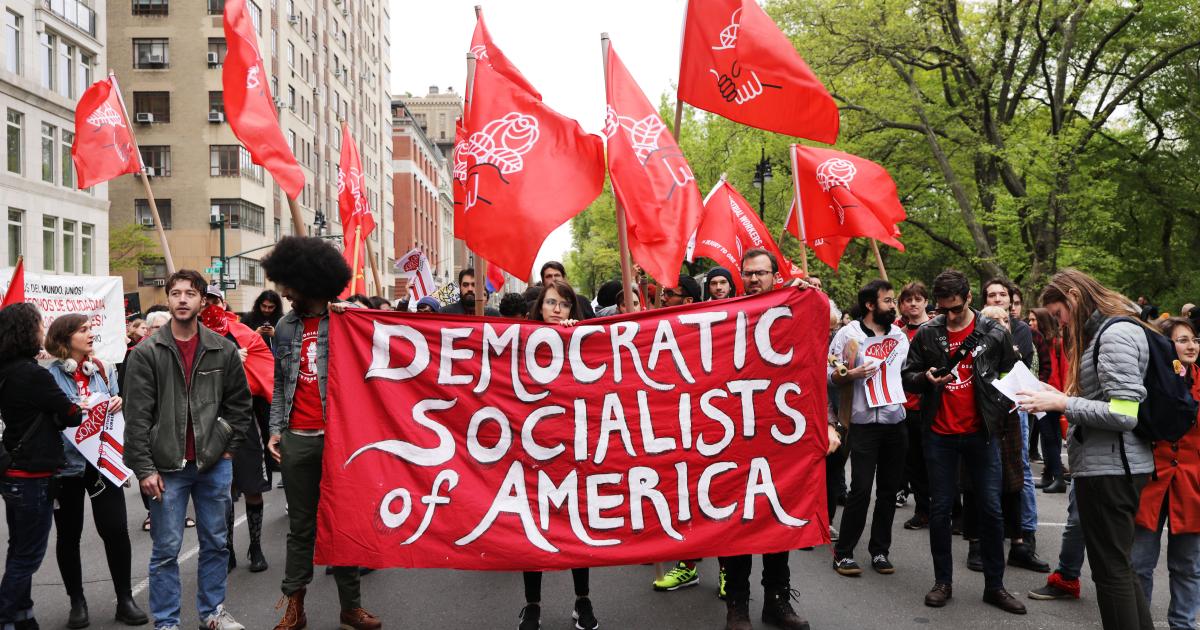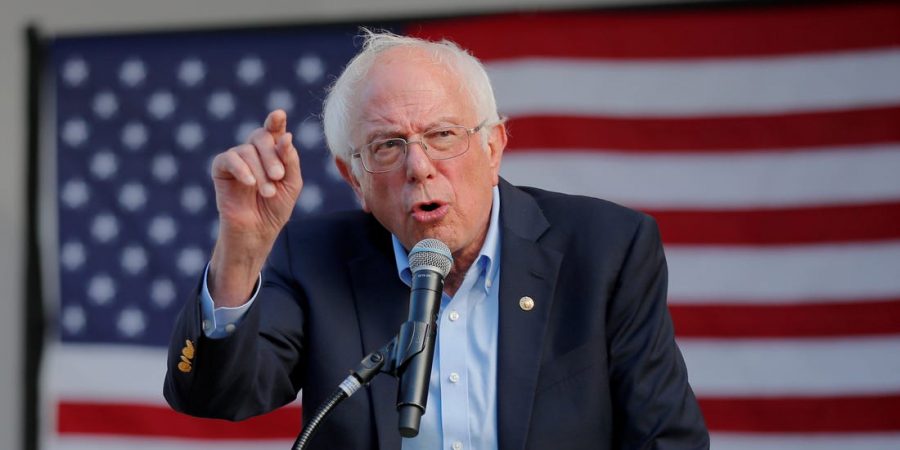Bernie Sanders and the ‘S’ Word
What’s a “democratic socialist,” anyway?
On Nov. 9, 1989, the world played witness to one of the most iconic moments in the twentieth century: the fall of the Berlin Wall. Dividing the city for nearly three decades, the destruction of the wall led to the reunification of the German people, and subsequently, a united nation of Germany.
The fall of the wall was the beginning of the end of the Cold War. A few years later, the Soviet Union would dissolve into 15 independent republics, and while many self-declared socialist countries existed, it appeared to be the end of the ideology as a competitor to the capitalism of the western world.
Bianca Cunningham is one of the co-chairs of the New York City chapter for the Democratic Socialists of America. Dating back to 1901, the current DSA can trace its roots back to May 1982.
“People see how the primary played out. The way the DNC conducted itself throughout the process. The laundry list of things to be terrified about the campaign that Trump is running. The day after Trump was elected, our organization doubled overnight. People are ready to do politics differently. People are ready to reorganize our priorities as a nation and locally.”
Despite two red scares and countless anti-socialist propaganda, America finally seems to be turning its eyes on the once-despicable ‘S’ word. At least some have.

A 2019 Gallup poll states how young people have been more prone to viewing socialism with favorable lenses.
“Since 2010, young adults’ positive ratings of socialism have hovered near 50 percent, while the rate has been consistently near 34 percent for Gen Xers and near 30 percent for baby boomers and traditionalists.”
Leading this youth-inspired charge has been no one other than the 78-year-old Senator Bernie Sanders. The now-Democratic politician is not only the longest-serving independent in U.S. Congressional history, but he is making his second bid at the Presidential Office after failing to secure the Democratic Nomination in 2016.
As stated by Cunningham, perhaps no other politician has ever done anything more to promote a socialist platform in America. Beginning his political career as the 37th mayor of Burlington, Vermont, Sanders has maintained a consistent platform of progressive ideals. During this, he has abided to the label of a “democratic socialist.”
While his fellow Democrat, Joe Biden, appears to be the frontrunner to receive the bid to go face Trump for the Presidency, Sanders’ influence on American politics already appears to be showing, whether it be politicians like House Representatives Alexandria Ocasio-Cortez or Rashida Tlaib. While the term “democratic socialism” can be thrown around recklessly, it’s very definition can be considered complicated.
There are many definitions one can find when asking about what socialism is in America. Google defines it as “a political and economic theory of social organization which advocates that the means of production, distribution, and exchange should be owned or regulated by the community as a whole.”
Aligning with the words of Karl Marx, this definition follows much of the classic definitions of socialism.
Dr. Daniel McCarthy, a political science professor at Mercy College, cites this when comparing it to “democratic socialism.”
“‘Democratic socialism’ is the label often given to the leftist policies of some European nations. It means something different from what ‘socialism’ used to mean for most people. Marxists and many academics still use the term in its old sense, which meant government ownership of most industries and service institutions. Now, ‘democratic socialism’ usually refers to a set of government policies that provide generous support to the less affluent people in society.”

Cunningham further elaborates on the differences. “To me, Democratic Socialism is leading with compassion, love, equity, justice. It’s us being able to govern according to a different set of priorities. It’s rejecting the idea that everything and everybody should be valued according to its ability to generate profit.”
Along with going into the social aspects of the ideology, she mentions what it means to her at its cores.
“It means that all workers deserve a living wage and the ability to join a union without intimidation. It means that the workers should share in the profits. It says that nobody should have to die because they can’t afford healthcare or the medicine they need. It’s exercising democracy in all forms — truly by the people.”
The issue and confusion come with the comparison to the nordic countries of Sweden and Denmark. Despite the praise for their “socialist” government, it should be noted that they aren’t socialist. While a platform of universal healthcare, free public education, and other social programs are typically included within socialist platforms, they don’t have the one box checked off to be “socialist”: workplace democracy.
Contrary to claims made, in order for something to be socialist, it needs to be owned and managed by the workers.
So while Sanders continues to use the label of a “democratic socialist,” the proper term would be a “social democrat.” While socially identical to many leftist ideas, the fundamental belief of social democracy lies within its idea that capitalism can be reformed.
McCarthy elaborates on that concept. “I think [Sanders] is mislabeling himself, but, the meaning of the label has changed, so maybe not. In any case, I think he has made a serious error in continuing to use the label. It continues to alienate many, probably most, voters, and doesn’t tell us much about his actual policies. Bernie’s rhetoric is much more radical than his actual policies. As Mayor, Representative, Senator, and presidential candidate, his proposed policies have rarely been far outside mainstream liberalism.”
Despite this, Cunningham still believes in Sanders as a socialist. “I can tell you firsthand that Bernie Sanders supports all levels of workplace democracy. In fact, he just tweeted to support a wildcat strike by grad student workers withholding final grades until they met a demand around affordable housing. I can tell you he rallied in front of a Verizon Wireless store with me after I was fired for my union organizing to put the 1 percent on notice and exposing Verizon’s enormous profits, even while they were laying off and outsourcing their work.”
Whether the term is exact for the Sanders in 2020 is irrelevant in the grand scheme of his political influence. While at this moment, it looks unlikely that he’ll be sitting in the White House next January, yet his influence has sprinkled down the political ladder all the way to the local level.
“Pre-Bernie DSA had 6,000 members, I believe. Then it grew to 12,000, then up into 30,000,” stated Cunningham.

This number, in the grand scheme of American politics, might seem insignificant, but for a country that less than 40 years ago was in a public war against the ideology, to see politicians use the label can empower, “That’s why you see the AOC’s and the Julia Salazar’s coming up now. Fierce women of color inspired by a politician they can articulate through a set of shared values. A departure with the obsession with the individual, the personality, rather engaged in a principled discussion on the issues and how best to address them.”
But could the day ever come where “socialism” isn’t a dirty word in the eyes of the average American? According to McCarthy, it’s complicated.
“Socialist won’t be the dirty word that it once was, and politicians in some areas (such as NYC) can embrace it, especially as the term ‘evolves.’ It has become a vague term, thus easier to adopt and less meaningful. But remember, AOC and Bernie run in places that are not at all typical of the U.S. It is not a label that politicians want to have in most of the country. I do not see that changing soon. That is why many Democratic politicians are terrified that Sanders could be at the head of the ticket.”

Steven Keehner was the Managing Editor of the greatest publication on the Hudson.
Hailing from the mediocre Town of Oyster Bay, New York, he enjoys...








